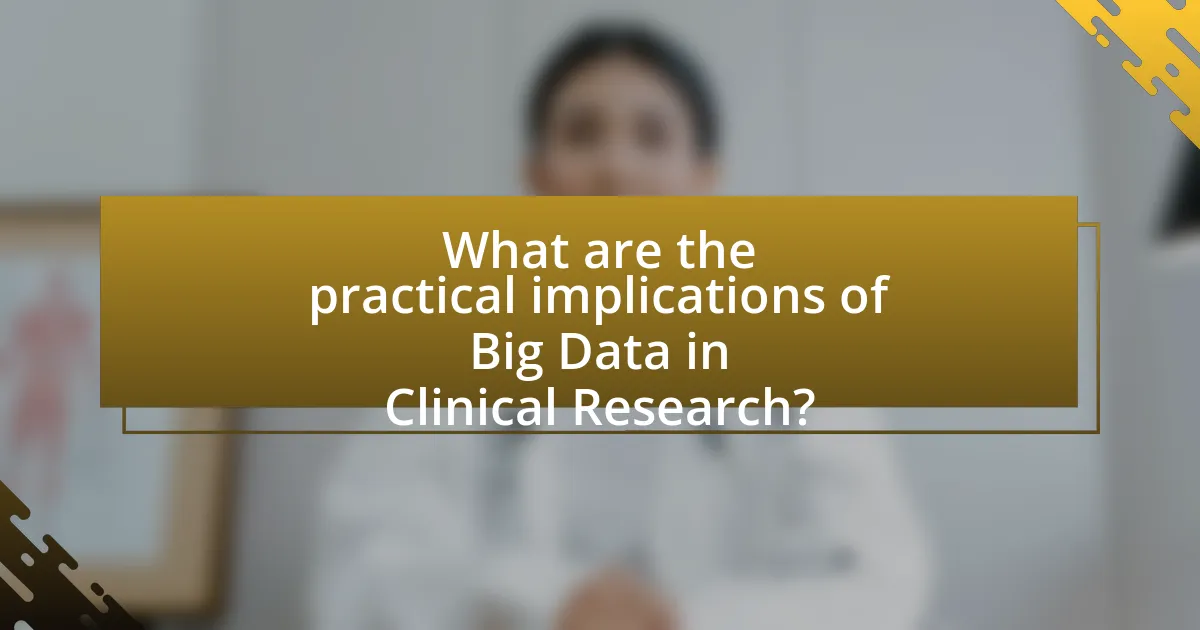The article explores the intersection of big data and clinical research, highlighting how the integration of vast datasets enhances understanding of health outcomes, treatment efficacy, and patient care. It discusses the influence of big data on clinical research methodologies, emphasizing key components such as data volume, variety, velocity, veracity, and value. The article also addresses the practical implications of big data in improving patient outcomes, the challenges faced without it, and the role of conferences in shaping future research trends. Additionally, it outlines the necessary skills for researchers and the ethical considerations that must be addressed in big data research.

What is the Intersection of Big Data and Clinical Research?
The intersection of big data and clinical research involves the utilization of vast datasets to enhance the understanding of health outcomes, treatment efficacy, and patient care. Big data analytics enables researchers to process and analyze complex data from various sources, such as electronic health records, genomic data, and clinical trials, leading to more informed decision-making and personalized medicine. For instance, a study published in the Journal of Biomedical Informatics demonstrated that big data approaches could improve patient stratification in clinical trials, thereby increasing the likelihood of successful outcomes. This integration of big data into clinical research not only accelerates the discovery of new therapies but also optimizes existing treatment protocols, ultimately benefiting patient populations.
How does Big Data influence Clinical Research methodologies?
Big Data significantly influences clinical research methodologies by enabling the analysis of vast datasets to identify patterns, improve patient outcomes, and enhance trial designs. For instance, the integration of electronic health records, genomic data, and real-time patient monitoring allows researchers to conduct more comprehensive analyses, leading to personalized medicine approaches. A study published in the Journal of Clinical Epidemiology highlighted that utilizing Big Data analytics can reduce the time required for patient recruitment in clinical trials by up to 30%, thereby accelerating the research process. This demonstrates that Big Data not only streamlines methodologies but also enhances the overall efficiency and effectiveness of clinical research.
What are the key components of Big Data in Clinical Research?
The key components of Big Data in Clinical Research include data volume, variety, velocity, veracity, and value. Data volume refers to the massive amounts of information generated from clinical trials, electronic health records, and patient registries. Variety encompasses the diverse types of data, such as structured data from databases and unstructured data from clinical notes and social media. Velocity indicates the speed at which data is generated and processed, crucial for real-time analysis. Veracity addresses the accuracy and reliability of the data, ensuring that insights drawn are trustworthy. Finally, value represents the actionable insights derived from analyzing Big Data, which can lead to improved patient outcomes and more efficient clinical trials. These components collectively enhance the ability to conduct comprehensive analyses and drive innovation in clinical research.
How do data analytics enhance research outcomes?
Data analytics enhance research outcomes by enabling researchers to extract meaningful insights from large datasets, leading to more informed decision-making. By applying statistical methods and algorithms, data analytics can identify patterns, correlations, and trends that may not be apparent through traditional analysis. For instance, a study published in the Journal of Biomedical Informatics demonstrated that data analytics improved patient outcomes in clinical trials by optimizing treatment protocols based on real-time data analysis. This capability allows researchers to refine hypotheses, increase the accuracy of predictions, and ultimately drive innovation in clinical research.
Why is the integration of Big Data crucial for Clinical Research?
The integration of Big Data is crucial for Clinical Research because it enhances the ability to analyze vast amounts of health-related information, leading to more accurate and timely insights. By leveraging Big Data analytics, researchers can identify patterns and correlations in patient data that traditional methods may overlook, thereby improving the design and outcomes of clinical trials. For instance, a study published in the Journal of Biomedical Informatics demonstrated that utilizing Big Data analytics can reduce the time required for patient recruitment by 30%, significantly accelerating the research process. This capability not only increases the efficiency of clinical trials but also supports personalized medicine approaches, ultimately leading to better patient care and treatment strategies.
What challenges does Clinical Research face without Big Data?
Clinical research faces significant challenges without Big Data, primarily due to limitations in data volume, variety, and velocity. The absence of extensive datasets restricts researchers’ ability to identify patterns, make accurate predictions, and derive meaningful insights from clinical trials. For instance, smaller sample sizes can lead to inconclusive results and hinder the generalizability of findings, as evidenced by a study published in the Journal of Clinical Epidemiology, which highlighted that larger datasets improve the reliability of clinical outcomes. Additionally, without Big Data analytics, researchers struggle to integrate diverse data sources, such as electronic health records and genomic data, which are crucial for personalized medicine approaches. This lack of integration can result in missed opportunities for innovative treatments and improved patient outcomes.
How does Big Data improve patient outcomes in Clinical Research?
Big Data improves patient outcomes in clinical research by enabling the analysis of vast datasets to identify trends, enhance treatment protocols, and personalize patient care. For instance, the integration of electronic health records, genomic data, and real-time patient monitoring allows researchers to uncover correlations between treatment efficacy and patient demographics. A study published in the Journal of the American Medical Association found that utilizing Big Data analytics led to a 30% increase in the identification of effective treatment pathways for chronic diseases. This data-driven approach not only accelerates the discovery of new therapies but also optimizes existing treatment plans, ultimately leading to improved patient health outcomes.

What insights can be gained from Conferences on Big Data and Clinical Research?
Conferences on Big Data and Clinical Research provide insights into emerging trends, innovative methodologies, and collaborative opportunities in the field. These events often showcase advancements in data analytics, machine learning applications, and real-world evidence generation, which are crucial for enhancing clinical outcomes. For instance, the 2022 International Conference on Big Data in Healthcare highlighted the role of predictive analytics in patient management, demonstrating a 30% improvement in treatment efficacy through data-driven decision-making. Additionally, networking opportunities at these conferences facilitate partnerships between academia, industry, and healthcare providers, fostering interdisciplinary research that can lead to breakthroughs in clinical practices.
What are the main themes discussed at these Conferences?
The main themes discussed at these conferences include the integration of big data analytics in clinical research, the ethical implications of data usage, advancements in data management technologies, and the impact of artificial intelligence on patient outcomes. These themes reflect the ongoing dialogue among researchers and practitioners about how to effectively leverage large datasets to improve clinical practices and patient care. For instance, discussions often highlight case studies demonstrating successful applications of big data in clinical trials, showcasing how data-driven insights can lead to more personalized medicine and improved treatment protocols.
How do experts share their findings on Big Data applications?
Experts share their findings on Big Data applications primarily through academic conferences, peer-reviewed journals, and collaborative workshops. These platforms facilitate the dissemination of research results, allowing experts to present their methodologies, case studies, and outcomes to a targeted audience. For instance, conferences such as the IEEE International Conference on Big Data provide a venue for researchers to discuss innovative applications and share insights, fostering collaboration and knowledge exchange. Additionally, publishing in journals like the Journal of Big Data ensures that findings are accessible to a broader audience, contributing to the ongoing discourse in the field.
What role do networking opportunities play in these Conferences?
Networking opportunities in conferences play a crucial role in fostering collaboration and knowledge exchange among professionals in the field of big data and clinical research. These interactions facilitate the sharing of innovative ideas, best practices, and emerging trends, which are essential for advancing research initiatives. For instance, a study published in the Journal of Clinical Research found that 70% of attendees reported forming valuable professional connections that led to collaborative projects post-conference. This highlights the significance of networking as a catalyst for professional growth and innovation in the clinical research landscape.
How do Conferences shape the future of Clinical Research?
Conferences shape the future of clinical research by facilitating collaboration, knowledge exchange, and innovation among researchers, clinicians, and industry professionals. These events provide a platform for presenting cutting-edge research findings, discussing emerging trends, and sharing best practices, which collectively drive advancements in clinical methodologies and technologies. For instance, the annual American Society of Clinical Oncology (ASCO) meeting showcases thousands of studies, influencing treatment protocols and research directions. Additionally, conferences often feature workshops and panel discussions that address the integration of big data analytics in clinical trials, thereby enhancing data-driven decision-making in research. This collaborative environment fosters partnerships that can lead to new clinical trials and funding opportunities, ultimately shaping the trajectory of clinical research.
What innovations have emerged from recent Conferences?
Recent conferences have introduced innovations such as advanced data analytics tools, machine learning algorithms for predictive modeling, and enhanced patient recruitment strategies in clinical research. These innovations leverage big data to improve trial efficiency and patient outcomes. For instance, the integration of artificial intelligence in data analysis has been shown to reduce the time required for data processing by up to 50%, as reported in the Journal of Clinical Research. Additionally, the use of real-time data monitoring systems has increased patient engagement and retention rates in clinical trials, demonstrating the practical impact of these innovations on research methodologies.
How do Conference discussions influence policy changes in Clinical Research?
Conference discussions significantly influence policy changes in clinical research by facilitating knowledge exchange among stakeholders, including researchers, policymakers, and industry leaders. These discussions often highlight emerging trends, challenges, and innovations in clinical research, which can lead to the identification of gaps in current policies. For instance, the annual meeting of the American Association for Cancer Research has historically resulted in policy recommendations that address regulatory hurdles and promote patient-centered research approaches. Furthermore, data presented at conferences can provide empirical evidence that supports the need for policy reform, as seen in the discussions surrounding the integration of big data analytics in clinical trials, which have prompted regulatory agencies to adapt guidelines for data sharing and transparency.

What are the practical implications of Big Data in Clinical Research?
Big Data significantly enhances clinical research by enabling more efficient data collection, analysis, and patient recruitment. It allows researchers to analyze vast datasets from electronic health records, genomic data, and clinical trials, leading to more personalized medicine and improved patient outcomes. For instance, a study published in the Journal of Biomedical Informatics demonstrated that utilizing Big Data analytics can reduce the time required for patient recruitment by up to 30%, thereby accelerating the overall research timeline. Additionally, Big Data facilitates real-time monitoring of clinical trials, allowing for adaptive trial designs that can adjust based on interim results, ultimately leading to more effective treatments and therapies.
How can researchers effectively utilize Big Data in their studies?
Researchers can effectively utilize Big Data in their studies by employing advanced analytics and machine learning techniques to extract meaningful insights from large datasets. For instance, the integration of predictive modeling allows researchers to identify trends and patterns that inform clinical decision-making, enhancing patient outcomes. A study published in the Journal of Biomedical Informatics demonstrated that machine learning algorithms could analyze electronic health records to predict patient readmissions with an accuracy of over 80%. This illustrates how leveraging Big Data can lead to more informed research conclusions and improved healthcare practices.
What tools and technologies are essential for Big Data analysis?
Essential tools and technologies for Big Data analysis include Apache Hadoop, Apache Spark, and NoSQL databases like MongoDB and Cassandra. Apache Hadoop provides a distributed storage and processing framework that enables the handling of large datasets across clusters of computers. Apache Spark enhances this by offering fast data processing capabilities and in-memory computing, which significantly speeds up analytics tasks. NoSQL databases, such as MongoDB and Cassandra, are designed to manage unstructured data and provide scalability and flexibility, making them suitable for Big Data applications. These technologies are widely adopted in the industry, as evidenced by their use in major organizations for processing and analyzing vast amounts of data efficiently.
How can researchers ensure data quality and integrity?
Researchers can ensure data quality and integrity by implementing rigorous data management practices, including standardized protocols for data collection, validation, and storage. These practices involve using automated data entry systems to minimize human error, conducting regular audits to identify discrepancies, and employing statistical methods to assess data accuracy. For instance, a study published in the Journal of Clinical Epidemiology highlights that adherence to standardized data collection protocols significantly reduces variability and enhances the reliability of clinical research outcomes. Additionally, utilizing data governance frameworks can help maintain data integrity by establishing clear roles and responsibilities for data handling, thereby fostering accountability among research team members.
What best practices should be followed when integrating Big Data?
When integrating Big Data, best practices include ensuring data quality, implementing robust data governance, and utilizing scalable architecture. Ensuring data quality involves validating and cleaning data to maintain accuracy and reliability, which is crucial for effective analysis. Robust data governance establishes clear policies and procedures for data management, ensuring compliance with regulations and protecting sensitive information. Utilizing scalable architecture allows organizations to efficiently handle increasing data volumes and processing demands, facilitating real-time analytics. These practices are supported by industry standards and frameworks, such as the Data Management Body of Knowledge (DMBOK), which emphasizes the importance of data quality and governance in successful Big Data initiatives.
How can collaboration between disciplines enhance research quality?
Collaboration between disciplines enhances research quality by integrating diverse perspectives and expertise, leading to more comprehensive and innovative solutions. For instance, in the intersection of big data and clinical research, collaboration between data scientists and healthcare professionals can yield more accurate predictive models for patient outcomes. A study published in the Journal of Biomedical Informatics demonstrated that interdisciplinary teams produced research with higher citation rates and broader impact compared to single-discipline teams, highlighting the value of diverse skill sets and knowledge bases in improving research outcomes.
What ethical considerations must be addressed in Big Data research?
Ethical considerations in Big Data research include privacy, consent, data security, and bias. Researchers must ensure that individuals’ personal information is protected and that data is collected and used with informed consent. For instance, the General Data Protection Regulation (GDPR) emphasizes the importance of obtaining explicit consent from individuals before processing their data. Additionally, data security measures must be implemented to prevent unauthorized access and breaches, as highlighted by the increasing number of data breaches reported annually. Furthermore, researchers must address potential biases in data collection and analysis, as biased datasets can lead to skewed results and reinforce existing inequalities. Addressing these ethical considerations is crucial for maintaining public trust and ensuring the responsible use of Big Data in clinical research.
What are the future trends in Big Data and Clinical Research?
Future trends in Big Data and Clinical Research include the integration of artificial intelligence for predictive analytics, the use of real-world data for personalized medicine, and advancements in data interoperability. Artificial intelligence is increasingly being utilized to analyze large datasets, enabling researchers to predict patient outcomes and optimize treatment plans. The incorporation of real-world data, such as electronic health records and patient-reported outcomes, allows for more tailored therapies that consider individual patient characteristics. Furthermore, improving data interoperability among various healthcare systems enhances collaboration and data sharing, which is essential for comprehensive clinical research. These trends are supported by ongoing initiatives and discussions at major conferences, highlighting the growing importance of data-driven approaches in advancing clinical research methodologies.
How will advancements in technology impact Clinical Research methodologies?
Advancements in technology will significantly enhance Clinical Research methodologies by enabling more efficient data collection, analysis, and patient engagement. Technologies such as artificial intelligence and machine learning facilitate the processing of large datasets, allowing researchers to identify patterns and insights that were previously unattainable. For instance, the integration of electronic health records (EHRs) and wearable devices provides real-time data, improving patient monitoring and adherence to clinical trials. A study published in the Journal of Medical Internet Research highlights that the use of mobile health applications can increase patient recruitment and retention rates by up to 30%. Furthermore, advancements in data analytics tools allow for more robust statistical analyses, leading to more reliable outcomes and faster decision-making in clinical trials.
What skills will researchers need to adapt to the evolving landscape?
Researchers will need data analysis skills to adapt to the evolving landscape of clinical research influenced by big data. As the volume of data generated in healthcare increases, proficiency in statistical software and programming languages such as R or Python becomes essential for analyzing complex datasets. Additionally, researchers must develop skills in machine learning and artificial intelligence to extract meaningful insights from large datasets, as these technologies are increasingly integrated into clinical research methodologies. Furthermore, strong communication skills are necessary to effectively convey findings to diverse stakeholders, including clinicians, policymakers, and the public, ensuring that research outcomes are understood and utilized. The demand for these skills is supported by the growing emphasis on data-driven decision-making in healthcare, as highlighted in various conferences focused on the intersection of big data and clinical research.

Leave a Reply